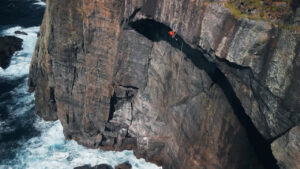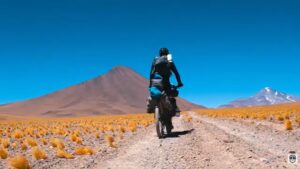“If it wasn’t for the sea, I wouldn’t be here right now.”
Jaeyoun Kim should have been happy. She had two children, a loving husband, and a successful career at a bank in Seoul. But as she closed her eyes every night, intrusive thoughts pounded at her skull. The thought of waking up for another day at her job was overwhelming.

The narrator escapes depression by embracing the ancient Japanese tradition of free diving. Photo: Screenshot
“I would come home and sit still and think. Having to spend another day like this was another day of competing,” she says early in Daughter of the Sea, a new documentary from Patagonia Films. “It was like going to battle instead of living.”
But admitting that she was unhappy was difficult. Jaeyoun came from six generations of haenyeo, the female free divers who make a living collecting seafood on South Korea’s Jeju island. It’s a long and proud tradition, but the work is grueling, and the women often continue diving until they are in their 80s or more.

Being a ‘haenyeo’ is a tradition that goes back many generations on Jeju island. Photo: Screenshot
Jaeyoun was the first member of her family to go to college, and her mother never wanted her to follow in the family’s footsteps. Instead, the young woman moved to Seoul to fulfill her dreams.
Or so she thought.
Crushed by a corporate job and on the brink of suicide, it took a timely intervention from Jaeyoun’s aunt to save her life. Jaeyoun accepted an invitation from her family to return to Jeju for a dive. One dive turned into more, and before long Jaeyoun felt her mind healing.
“When we work, we hold our breath when we go into the sea. But in a way it’s also a space where I can breathe,” she explains. “Other troubles and worries, different thoughts, when you do haenyeo work, that will all go away for a little while.”

Jaeyoun found peace in a family tradition she thought she’d left behind. Photo: Screenshot
In time, Jaeyoun made the decision to leave her job and become a full-time haenyeo.
Patagonia Films always produces fine work, but the measured pacing, subtle score, and well-crafted visuals in Daughter of the Sea stand out. The underwater sequences, in particular, are worthy of note. Rendered in slow motion and color graded in mute blues and greens, the shots serve to represent the dark place Jaeyoun found herself in as well as the relief and peace she gained as she returned to her roots. It’s a lovely little watch, though viewers should take note that themes of depression and suicide are handled openly and frankly.

The underwater cinematography in ‘Daughter of the Sea’ is top-notch. Photo: Screenshot
“It’s physically difficult, but how can they do this for so long? It’s because there is something the sea gives us with our work,” Jaeyoun says to close the film. “When we go to the sea, we feel at ease. And when we come out of the sea, we feel that sense of satisfaction and accomplishment.
“To do this work while your body allows it is one of many things to be proud of.”






